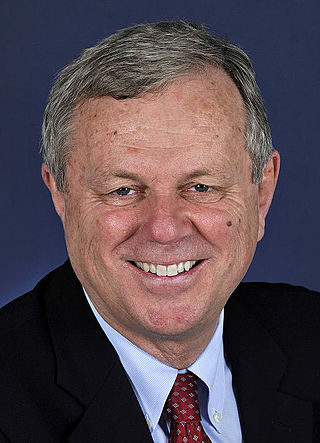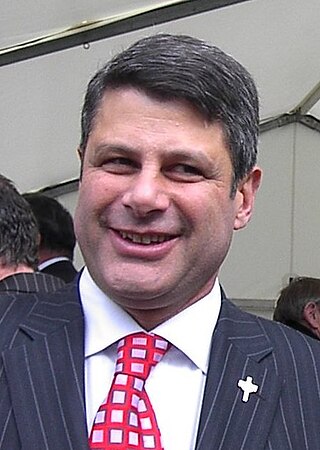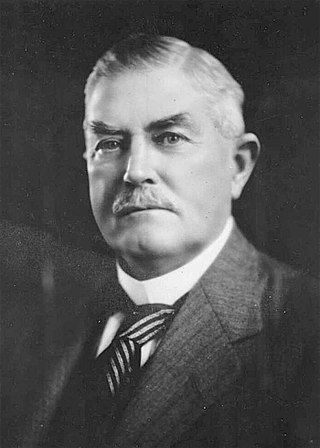Related Research Articles

The Australian Democrats is a centrist political party in Australia. Founded in 1977 from a merger of the Australia Party and the New Liberal Movement, both of which were descended from Liberal Party dissenting splinter groups, it was Australia's largest minor party from its formation in 1977 through to 2004 and frequently held the balance of power in the Senate during that time.

The Legislative Council, or upper house, is one of the two chambers of the Parliament of South Australia. Its central purpose is to act as a house of review for legislation passed through the lower house, the House of Assembly. It sits in Parliament House in the state capital, Adelaide.
SA First, also known as South Australia First, was a South Australian political party formed in 1999 by dissident Labor MP Terry Cameron. The party contested the 2002 state election but failed to elect any candidates to the Parliament of South Australia.
This is a list of members of the South Australian Legislative Council between 2002 and 2006. As half of the Legislative Council's terms expired at each state election, half of these members were elected at the 1997 state election with terms expiring in 2006, while the other half were elected at the 2002 state election with terms expiring in 2010.
Ivan Peter Lewis was an Australian politician. Lewis was a member of the South Australian House of Assembly between 1979 and 2006 in the electorates of Hammond, Ridley, Murray-Mallee and Mallee. From 1979 he was in the House as a Liberal member, however he was expelled from the Liberals in 2000. He was re-elected as an independent, serving until 2006. His decision to serve as Speaker of the South Australian House of Assembly for a Labor government resulted in Mike Rann becoming Premier of South Australia from the 2002 election. His death was reported on 28 September 2017 to have been earlier in the week, in Sydney.

The state election for the 51st Parliament of South Australia was held in the Australian state of South Australia on 18 March 2006 to elect all members of the South Australian House of Assembly and 11 members of the South Australian Legislative Council. The election was conducted by the independent State Electoral Office.

Robert Lawrence Brokenshire is a South Australian dairy farmer and former member of the South Australian Parliament. He represented the Australian Conservatives from 26 April 2017 to election defeat in 2018, and Family First Party before that.

State elections were held in South Australia on 9 February 2002. All 47 seats in the South Australian House of Assembly were up for election, along with half of the 22 seats in the South Australian Legislative Council. The incumbent Liberal Party of Australia led by Premier of South Australia Rob Kerin was defeated by the Australian Labor Party led by Leader of the Opposition Mike Rann. The Labor Party won 23 out of 47 seats, and then secured the one more seat it needed for a majority by gaining the support of independent Peter Lewis.

Nick Xenophon is an Australian politician and lawyer who was a Senator for South Australia from 2008 to 2017. He was the leader of two political parties: Nick Xenophon Team federally, and Nick Xenophon's SA-BEST in South Australia.
Martin Bruce Cameron is an Australian politician. He was a Liberal Party of Australia member of the Australian Senate from May to October 1969. He was later a member of the South Australian Legislative Council from 1971 to 1990, sitting as a Liberal except during 1973–1976, when he represented the splinter Liberal Movement.
Terence John Stephens is an Australian politician, and a member of the South Australian Legislative Council since being elected in 2002, representing the South Australian Division of the Liberal Party of Australia. He is the President of the South Australian Legislative Council since May 2022. He previously served in this role from February to September 2020,.
John Mario Gazzola is an Australian politician, and member of the South Australian Legislative Council for the Labor Party from 2002 to 2018. He was President of the Council from 2012 to 2014.
Bernard Vincent Finnigan is an Australian former politician who served as a member of the South Australian Legislative Council from 2006 until 2015. He was appointed in May 2006 as a member of the South Australian Branch of the Australian Labor Party to the Legislative Council in a casual vacancy triggered by the death of Terry Roberts. Elected at the 2010 election, Finnigan briefly served in the Rann government cabinet from February until April in 2011, when Labor suspended him from the party, sitting thereafter as an independent backbencher until his 2015 parliamentary resignation. He was the Acting Police Minister at the time of his arrest.

The 2006 Victorian state election, held on Saturday, 25 November 2006, was for the 56th Parliament of Victoria. Just over 3 million Victorians registered to vote elected 88 members to the Legislative Assembly and, for the first time, 40 members to the Legislative Council under a proportional representation system. The election was conducted by the independent Victorian Electoral Commission.
This is a list of members of the South Australian Legislative Council between 1997 and 2002. As half of the Legislative Council's terms expired at each state election, half of these members were elected at the 1993 state election with terms expiring in 2002, while the other half were elected at the 1997 state election with terms expiring in 2006.
This is a list of members of the South Australian Legislative Council between 1993 and 1997. As half of the Legislative Council's terms expired at each state election, half of these members were elected at the 1989 state election with terms expiring in 1997, while the other half were elected at the 1993 state election with terms expiring in 2002.

John Cameron "Robbo" Robertson is a former Australian politician who served as the leader of the Labor Party in New South Wales from 2011 to 2014. Before entering politics he was prominent in the union movement.

Peter Bryden Malinauskas is an Australian politician serving as the 47th and current premier of South Australia since March 2022. He has been the leader of the South Australian branch of the Australian Labor Party (ALP) and a member of the House of Assembly (MHA) for the division of Croydon since April 2018. He was previously the Leader of the Opposition from 2018 until he led his party into government in the 2022 state election.

The 1922 New South Wales state election was held on 25 March 1922. This election was for all of the 90 seats in the 26th New South Wales Legislative Assembly and it was conducted in multiple member constituencies using the Hare Clark single transferable vote. The 25th parliament of New South Wales was dissolved on 17 February 1922 by the Governor, Sir Walter Edward Davidson, on the advice of the Premier James Dooley.
The National Party was a political party active in South Australia from 1917 to 1923. As with the federal National Labor Party, it was created in the wake of the Australian Labor Party split over conscription, resulting in the February 1917 expulsion from the South Australian Labor Party of the Premier, Crawford Vaughan, and his supporters. It was initially known as the National Labor Party like its federal counterpart, but was renamed at a conference in June 1917. The party initially continued in government under Vaughan, but was subsequently defeated in parliament in July 1917, and thereafter served as the junior partner in a coalition with the Liberal Union under Archibald Peake.
References
- ↑ Coorey, Phillip (25 July 1998). "The man most likely". The Advertiser . p. 19.
- 1 2 Kelton, Greg (30 January 2002). "State Election 2002: New party could be the one to watch". The Advertiser . p. 13.
- ↑ "The Verdict: Election 2006". The Sunday Mail . 19 March 2006. p. 13.
- ↑ "Terry Cameron". Former members of the Parliament of South Australia . Retrieved 12 November 2022.
- ↑ Mayne, Stephen (25 January 2006). "Tracking the unionists in parliament". Crikey . Retrieved 28 April 2014.
- ↑ Nick Minchin (17 March 2008). "Condolences: Hon. Clyde Robert Cameron AO". Parliamentary Debates (Hansard) . Australia: Australian Senate.